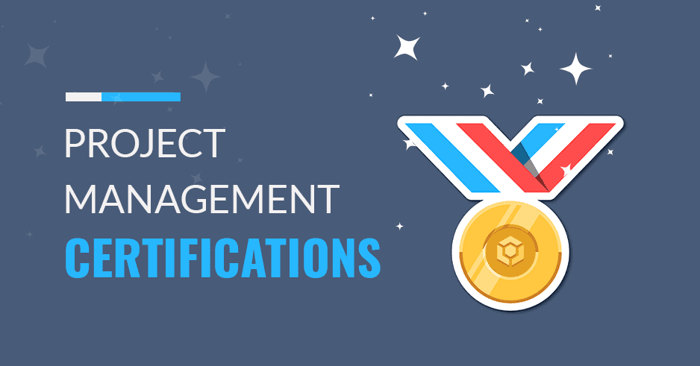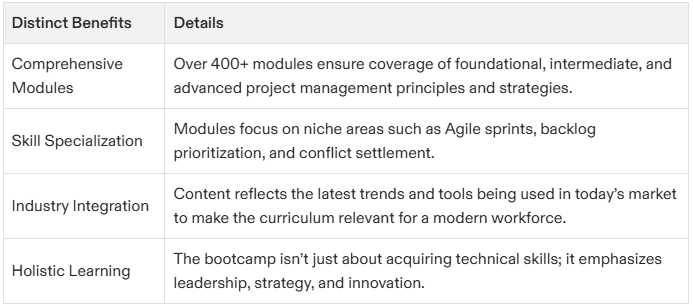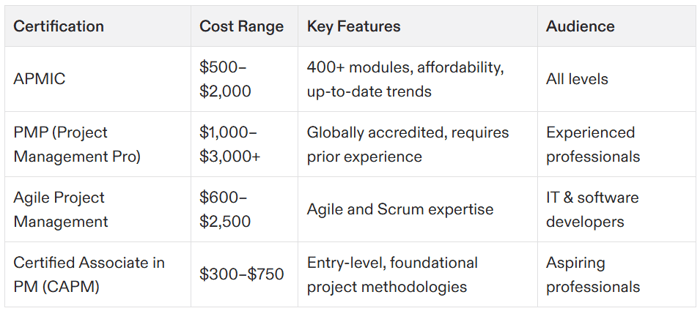Table of Contents
Hey there, future master of deadlines and doer of the impossible! Are you ready to catapult your career to stellar heights with a project management certification? Well, buckle up, because you're about to embark on an epic journey through the maze of certifications that will not just add a shiny badge to your resume but also arm you with superpowers in productivity and leadership!
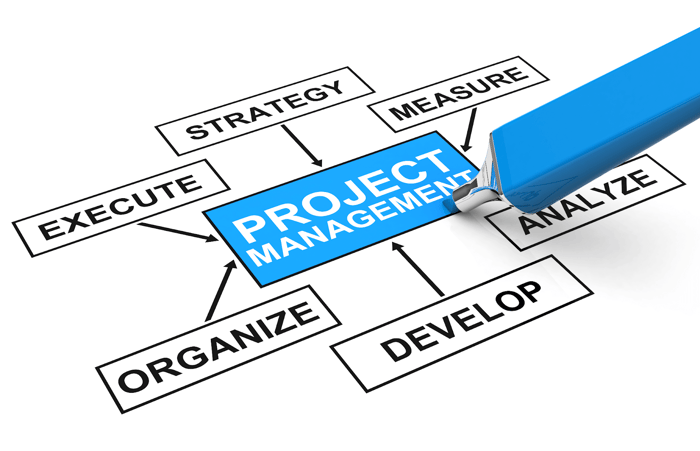
The Crucial Role of Project Management Certifications
In the ever-evolving world of business, project management certifications are more than just fancy titles; they are your ticket to new opportunities, higher salaries, and the respect of your peers. Whether you're a newbie looking to break into the field or a seasoned pro aiming for the stars, understanding the qualifications for project management certifications in 2025 is your first step toward glory.
Why Certifications Matter More Than Ever
In the fast-paced and ever-evolving landscape of today's industries, the significance of project management certifications has never been more pronounced. As we navigate through the complexities of a post-pandemic world, where project scopes expand rapidly and deadlines become increasingly stringent, the value of possessing a recognized certification transcends the traditional merits previously appreciated. Let's delve into how achieving the right certification is not just advantageous but essential for elevating your career to new heights.
Related Blog: Jobs with Project Management Certification

Higher Earning Potential
One of the most compelling reasons to pursue a project management certification is the potential for a significantly higher salary. Data consistently shows that certified project managers enjoy up to a 25% salary premium compared to their uncertified peers. For instance, in the U.S., professionals holding a Project Management Professional (PMP) certification can earn an average annual salary of $123,000. This is a stark contrast to the $93,000 typically earned by those without this credential. This substantial difference in earnings is a clear indicator of the high regard in which certified expertise is held across industries. Companies recognize and reward the advanced knowledge and skills demonstrated by certified professionals, viewing them as valuable assets who can lead projects more efficiently and effectively.
Career Security
In today's job market, where digital transformation is reshaping every sector, certification serves as more than a merit badge—it's a crucial component of career security. As traditional roles become increasingly digitized, the demand for skilled project managers with formal certifications continues to rise. Employers prioritize candidates with recognized credentials because they are seen as better equipped to handle the complexities of modern project environments. Certification thus acts as a career insurance policy, enhancing your employability and helping you stand out in a competitive job market. It positions you as a leading candidate for advancement and opens doors to new opportunities that might otherwise be inaccessible.
Skill Enhancement

Project management is inherently challenging, involving the coordination of numerous elements and the management of various stakeholder expectations. Certifications prepare you to tackle these challenges with a robust set of tools and methodologies that have been tried and tested across industries. These programs provide comprehensive training in crucial areas such as risk mitigation, where you learn to anticipate potential issues and devise effective strategies to prevent them. Similarly, they cover resource optimization—ensuring you can manage project resources efficiently, balancing time, budget, and manpower to meet project goals without unnecessary expenditure.
Related Blog: Best Project Management Certification Program
Moreover, certified project managers are trained to enhance their leadership skills, which are essential for motivating teams and driving projects to successful completion. They are adept at communication, negotiation, and conflict resolution, all of which are vital for managing the diverse needs of team members and stakeholders alike. This skill set is particularly important in a post-pandemic era, where remote work and virtual teams have become more prevalent, requiring project managers to be proficient in digital communication tools and techniques.
Meeting the Demands of a Dynamic World
The world of project management is dynamic, requiring continual adaptation to new technologies and methodologies. Certifications ensure that project managers are not only up to date with the latest industry trends but also capable of implementing these innovations in their daily work. This ability to adapt and innovate is crucial in maintaining project relevance and effectiveness, particularly in industries that are rapidly evolving or subject to significant regulatory changes.
Furthermore, the process of obtaining a certification itself instills a discipline of lifelong learning. Certified project managers are often required to participate in ongoing education and professional development activities to maintain their credentials. This requirement fosters a culture of continuous improvement and ensures that they remain at the cutting edge of their profession.
Related Blog: Unlocking Project Management Certification Qualifications
What Certifications Should You Consider?
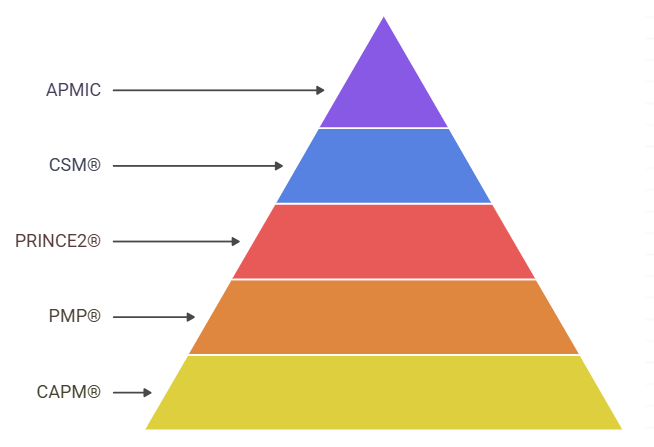
Let’s dive into the specifics. From the foundational to the specialized, here’s a breakdown of top certifications that are turning heads in 2025:
PMP® (Project Management Professional): The gold standard of project management certifications, ideal for those who dream big and manage bigger.
CAPM® (Certified Associate in Project Management): Perfect for beginners eager to get their feet wet in the project management world.
PRINCE2®: Highly prized in Europe and beyond for its rigorous process-based approach to project management.
Certified ScrumMaster® (CSM): A must-have for IT and software development professionals thriving in agile environments.
APMIC Certification: With over 400 modules, it’s tailored for those who refuse to fit the mold and aim to shape the future of project management across various industries.
Stepping Stones to Certification
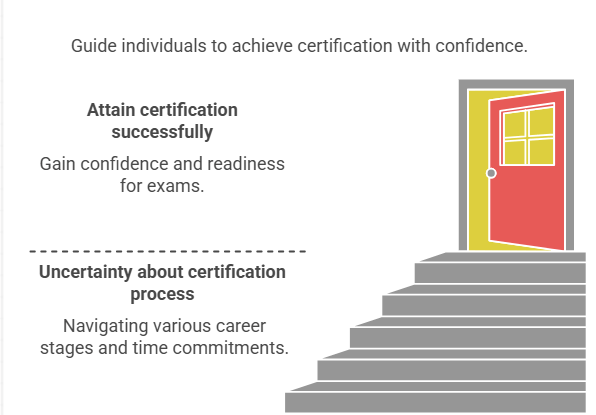
Achieving certification might seem daunting, but fear not! Here’s your roadmap:
Identify Your Career Stage: Are you a beginner, or have you been around the block a few times? Your experience level will guide your certification choice.
Assess Your Time: Some certifications, like the PMP, require a significant investment of time, while others could be just a few weeks of commitment.
Training and Education: Whether it’s classroom training or online courses, pick the method that fits your learning style and schedule.
Prepare to Succeed: Utilize study guides, practice exams, and simulation tests to ensure you’re not just ready but confident on exam day.
Facts About Project Management Certifications
First Project Management Certification Offered in 1984
Did you know that the first project management certification was offered in 1984? Project management has come a long way since! Learn about the history of PMP certification.Certified Project Managers Complete Projects More Efficiently
Project managers who hold a certification are 30% more likely to complete their projects on time and under budget.Growing Demand in Renewable Energy Projects
The demand for certified project managers in renewable energy projects has skyrocketed by 75% in the last five years alone.High-Performing Projects Led by Certified PMPs
Research shows that 60% of high-performing projects are conducted by certified PMPs.Certified Project Managers Are More Efficient
A study found that certified project managers are 40% more efficient in resource allocation than their non-certified counterparts.Agile-Certified Project Managers Achieve Faster Delivery
Agile-certified project managers report 50% faster delivery times on software projects.PRINCE2 Certification Preferred in Government Projects
PRINCE2-certified individuals are often preferred for government and public sector projects in over 50 countries.APMIC Certification Covers Emerging Fields
The APMIC certification covers emerging fields like AI project management and sustainability, keeping you ahead of the curve.Networking Opportunities for Certified Project Managers
Certified project managers have access to exclusive online forums and communities, boosting their networking opportunities.Certification Improves Job Satisfaction
Being certified can improve your job satisfaction rate by up to 20%, as it often leads to higher recognition and authority within projects.
Conclusion: Your Path to Project Management Mastery
Embarking on the journey to becoming a certified project manager is about forging a path filled with growth, challenges, and substantial rewards. By understanding the project management certification landscape of 2025, you're setting yourself up for a successful, dynamic career.
Whether you're considering the PMP, CAPM, PRINCE2, CSM, or the versatile APMIC, remember that each certification can open doors to new opportunities and elevate your professional status. So, why wait? Dive into the comprehensive world of project management certifications at APMIC—where we offer the best Project Management Certification, tailor-made for ambitious professionals like you. Start your certification journey today and rock the world of project management!
FAQs
How do I choose the right project management certification for me?
Consider your industry, career goals, and the specific skills you want to develop. Look for certifications that align with these elements to maximize your investment.
Are project management certifications worth it in 2025?
Absolutely! With the complexity of modern projects, having a certification can significantly boost your credibility and career prospects.
Can I manage projects without a certification?
While it’s possible, certified project managers are often preferred for their proven skills and standardized approach to managing challenges.
What's the best way to prepare for a project management certification exam?
Combine practical experience with study guides, courses, and practice exams. Engaging with a study group can also be incredibly helpful.
How often do I need to renew my project management certification?
Most certifications require renewal every few years to ensure your skills and knowledge remain up-to-date.
Does a project management certification improve team performance?
Yes, certified managers typically have better tools and methodologies at their disposal, leading to more efficient team performance.

